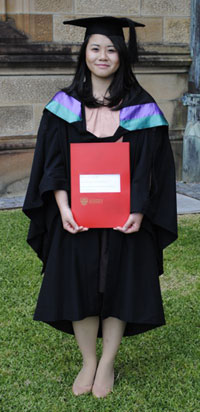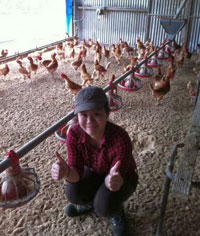



Graduate Mary Tran Sees Future in Poultry Industry
AUSTRALIA - Upon the completion of her Higher School Certificate, Miss Mary Tran commenced an undergraduate Bachelor of Animal and Veterinary Bioscience degree at The University of Sydney. With support from the Poultry CRC over the past year, Mary has recently graduated with Honours Class II, Division 1.Her Honours project focussed on the influence of incubation conditions on (commercial) broiler leg integrity. From this experience she has seen the opportunities for young scientists within the poultry industry, and anticipates that this is where her career will lie.


"My project looked into three breeds; a fast feathering dam parent line (Line 12), Cobb 500 and Ross 308," said Mary. Her findings concluded that incubation conditions, breed and gender all had independent effects on bird performance and leg strength across the three strains. More notably, said Mary, was the influence of the test incubation conditions on broiler leg health. "This study has shown that incubation conditions within the range used by commercial practices may affect leg health."
A drop in temperature at day 6, an increase in temperature by just 0.5?C after day 7 of incubation, and a decrease in relative humidity by 3% throughout incubation were all shown to affect leg integrity, as evidenced by the effects on serum calcium levels, femoral bone ash, tibial length, and latency to lie. "The L12 demonstrated good leg strength at a young age, but there seemed to be an age related decline in leg strength under these incubation conditions," she said. However the project had difficulty drawing similar conclusions (with confidence) with regard to the impact of these conditions on leg integrity in the Cobb and Ross breeds. "There are large variations in the multiple parameters measured across the several sample days for these breeds; this remains to be explored further," concluded Mary.
Mary found that the experimental design (a large multi factorial experiment), and the resulting statistical analysis were the greatest challenges she faced throughout her Honours project. "The completion of my project could not have been achieved without the extensive support provided by my supervisors, Dr Wendy Muir and Dr Peter Groves, and I thank them for this support," she said.
Mary hopes that her research will benefit the poultry industry by allowing hatcheries to fine tune their incubation conditions to ensure better welfare for birds, as well as reduce culling rates and economic losses. "With further research to assess the susceptibility of Cobb and Ross to leg weakness under the incubation conditions evaluated within the project, the poultry industry may be able to improve incubation conditions in a broiler strain-dependant manner," said Mary. "My overall area of interest lies in animal welfare, explaining my choice in exploring links between incubation conditions and leg weakness in broilers for my honours project."
Currently Mary is casually employed by the Poultry Research Foundation at the University of Sydney, assisting Dr Greg Cronin in the early stages of his project looking into feather pecking in free range layer hens. She hopes to gain full-time employment as a research assistant on this project in the near future. In the longer term, she foresees further involvement in the poultry research arena via a Master's degree or a PhD. "The Poultry industry is an industry of exponential growth and there is much to learn and gain in poultry research. Also, research involving chickens is much easier in comparison to other livestock, as there is room for more replication and poultry are easier to handle," said Mary.








